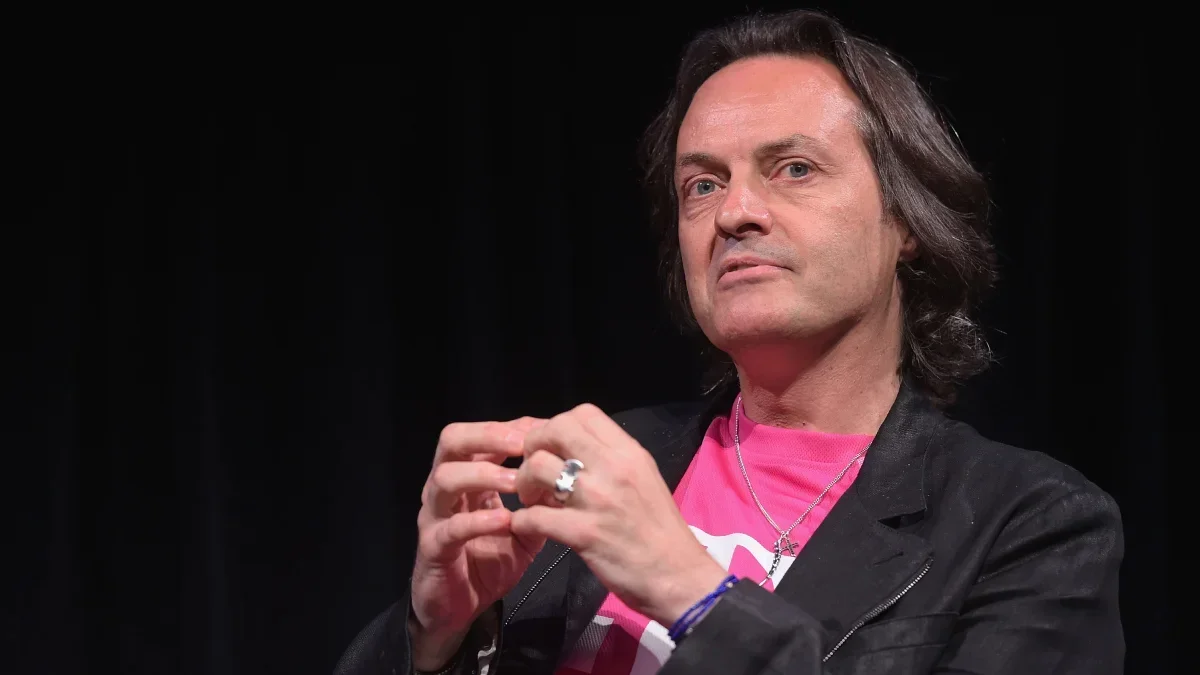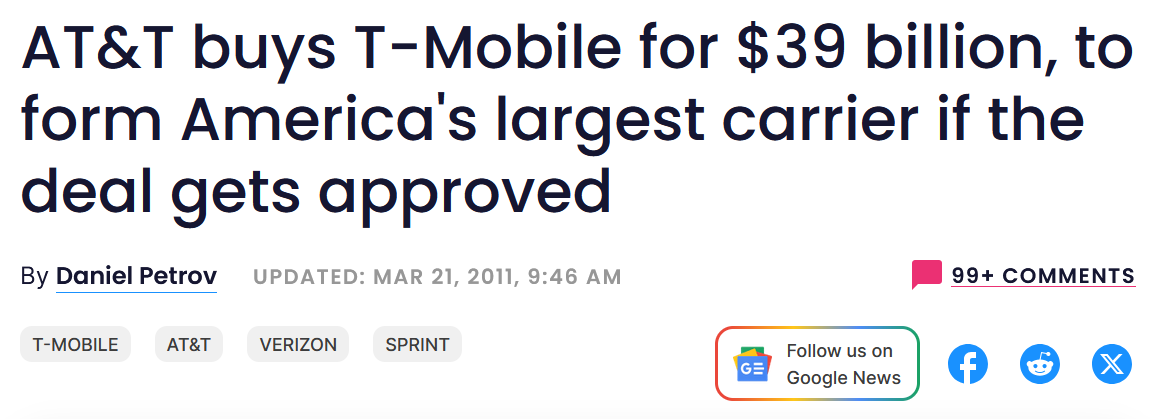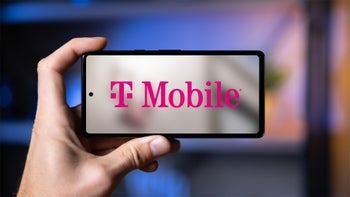Will T-Mobile's rags-to-riches story end up as a round trip?

The amazing story of T-Mobile's rise would make for an interesting case study for any business school. The company was dead last among the four major US wireless carriers about 20 years ago. Among these four, the first to offer 3G was Verizon in 2002. Dead last was T-Mobile which didn't launch its 3G service until 2008. T-Mobile was also last to offer 4G LTE. In early 2011, it appeared that AT&T would be buying T-Mobile for $39 billion.
Luckily for T-Mobile (although it didn't appear that way at the time), the FCC and DOJ didn't like the deal and both put the kibosh on the transaction. Why was this good for T-Mobile? The little carrier that AT&T was going to acquire for $39 billion is now the fastest-growing wireless provider, valued at $288 billion. At the same time, it moved from being dead last among the four US majors to a solid number two behind only Verizon.
Two events made T-Mobile what it is today
Two events helped T-Mobile get where it is today. The first was the breakup package AT&T had to pay T-Mobile for failing to complete its deal. The latter walked away with a sweet haul consisting of $3 billion of AT&T's cold cash and a seven-year roaming deal with AT&T covering 3G service. Once the package was put into place, T-Mobile's coverage rose from 230 million Americans to 280 million.

In March 2011 AT&T offered to buy T-Mobile for $39 billion. | Image credit-PhoneArena
But the most important change made by T-Mobile took place in the executive suite in September 2012. That was when a 32-year telecom veteran named John Legere took over the CEO job from interim CEO Jim Alling. All Legere did was turn T-Mobile around with his brash personality. Legere hardly looked the part of a wireless industry executive with his long hair. He came to work wearing T-Mobile t-shirts and sneakers. But he knew how to take care of customers by understanding the things that they wanted and wouldn't stand for.
He quickly established that T-Mobile was not like the other guys by slapping the Un-carrier name on the company. He also got rid of the two-year contracts and subsidized phones that were slowing down subscriber growth in the industry. In 2019, Legere was named Wireless CEO of the Year by Glassdoor for the fourth consecutive year. That year, he also was ranked as the fourth best CEO in all industries.
Years after he left T-Mobile following the acquisition of Sprint, several articles took aim at the executive for his stance against unions and for possibly fibbing to the FCC and DOJ about its plans to expand stores and keep the payroll steady in the face of the Sprint deal. But here's the thing. Since being replaced by Legere's right hand man Mike Sievert, T-Mobile has seen its pro-consumer Un-carrier reputation shrivel up and die.
Sure, the carrier continues to put up some amazing numbers quarter after quarter but if you speak to T-Mobile reps, you understand that they are under the whip constantly. The sales crew must meet certain metrics each month to keep their jobs and this puts them under extraordinary pressure to add lines, sell accessories and device insurance even when the customer doesn't want any of these things.
There is no denying that under Sievert, the executive team's focus has shifted from killing customer pain points to getting the stock to new highs. Consider the carrier's recent move to launch the Experience More and Experience Beyond plans. While T-Mobile advertises the new plans as costing $5 less per line than the previous Go5G plans they replaced, the reality is different. The new plans no longer exclude taxes and fees which was an Un-carrier move announced by T-Mobile back in 2017.
Roger Entner, founder of Recon Analytics, a telecomm analysis and consulting firm, says, "The Un-carrier is dying a slow death and still waiting for an EMT." With numerous acquisitions including Sprint, Mint Mobile, and the proposed purchase of some of UScellular's wireless operations, T-Mobile is no longer the underdog and is now a wireless behemoth. As Jeff Moore, principal of Wave 7 Research points out, T-Mobile has had a total of 14 Un-carrier events, each one designed to help its customers.
This is why T-Mobile says it stopped offering plans with taxes and fees included
Since 2017, T-Mobile has hosted only one Un-carrier event and it has held none over the last five years. And some of the excuses the carrier gives for its new anti-consumer actions are just not believable. For example, a T-Mobile spokesperson told Fierce Wireless that it stopped offering plans with "taxes and fees included" because the carrier received feedback from customers saying that it was just too confusing. Yes, paying $0 for fees and taxes always throws me off (read that in a sarcastic tone).
Not all analysts believe that T-Mobile is fading. The carrier is still arguably the 5G King in the US and its 5G data speeds trounce the figures put up by Verizon and AT&T. What many T-Mobile subscribers don't know is that the faster data speeds they enjoy is the result of a decision made by T-Mobile during the Legere years to build out its 5G network using mid-band spectrum. Acquiring a hoard of 2.5GHz mid-band spectrum from Sprint was the main reason that T-Mobile went after Sprint in the first place.
While AT&T and Verizon originally used high-band mmWave spectrum to build their 5G networks, the short distances that such spectrum travel wiped out the speed advantage of this spectrum. When T-Mobile's rivals saw how the carrier took over 5G leadership in the US with mid-band spectrum, they spent more than $68 billion during an FCC auction to obtain mid-band spectrum in the C-band.
Tthere are plenty of subscribers and reps who will tell you that they long for the good old days when a brash John Legere would insult the competition and announce Un-carrier perks that attracted new subscribers.
Follow us on Google News














Things that are NOT allowed:
To help keep our community safe and free from spam, we apply temporary limits to newly created accounts: